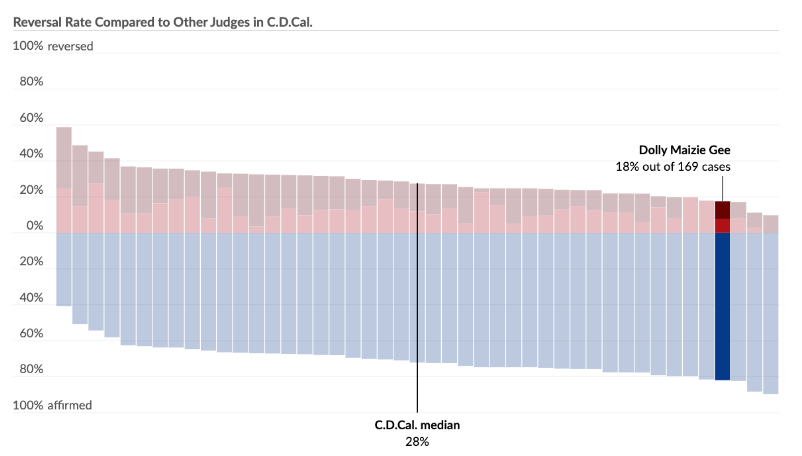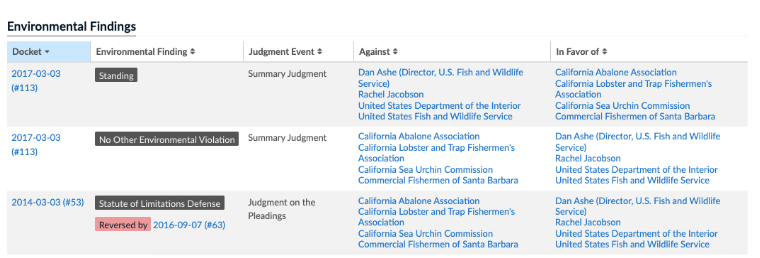Lex Machina Has Achieved Another Great Win For Legal Analytics With The Introduction Of Appellate Analytics
Tackling appeals has historically been difficult and time-consuming for attorneys, and now Lex Machina has the technology to hone in on key aspects of appeals documents and pull out accurate information to help your case.
 As the practice of law has become increasingly data-driven, Lex Machina has been leading the charge to create tools that utilize data to the fullest, which provide superior insights to attorneys advising their clients in litigation.
As the practice of law has become increasingly data-driven, Lex Machina has been leading the charge to create tools that utilize data to the fullest, which provide superior insights to attorneys advising their clients in litigation.
Now, in one of their largest product releases yet, Lex Machina has added Appellate Analytics to its Legal Analytics platform, providing even more valuable information to attorneys crafting successful litigation strategies to win cases. Practitioners have requested appellate data, and Lex Machina delivered by layering 400,000 circuit court cases on top of the 3.2 million district cases already available in their database.
The wealth of appellate information now available from Lex Machina allows you to understand the entire history of your cases in a way that is unparalleled. This enhances your ability to provide the best possible strategies and advice to your clients.
The Difficulty in Tracking Appeals
Tackling appeals has historically been difficult and time-consuming for attorneys. For example, simply determining which judges presided over a given appellate case can be a challenge. PACER lacks a field for specifying the identity of the panel members who ruled on appeals cases, and the membership of specific appellate panels may vary widely.
Given their complete data set of underlying civil district court cases, Lex Machina was in the best position to bring appellate data to the market. Lex Machina has the technology to hone in on key aspects of appellate documentation and extract the relevant and accurate information.
By matching appellate data with its comprehensive existing dataset, Lex Machina allows practitioners to derive a complete and accurate understanding of the history of any given case by easily navigating between what happened in district court and on appeal.
While Lex Machina is widely known for their detailed graphs and metrics, they also ensure the availability of the underlying documentation. The opinions, underlying briefs, and other documents are critical to generating the information available through Appellate Analytics, and Lex Machina provides those documents to users as well. You can search relevant appeals along various metrics, such as by judge or originating practice area. Then you can click through to the supporting documents to understand the full picture.
How Appellate Analytics Enhances the Legal Analytics Platform
One of the most powerful use cases for Appellate Analytics, and one that is highly valued by users, is the ability to understand the reversal rates of specific judges.
To begin, you can search for a specific district court judge to access their analytics.
The judge page includes total civil federal district court cases the judge presided over and the subset of cases where they were the originating judge of the appealed decision. The U.S. District Judge Dolly M. Gee of the C.D. in California has 6,326 federal district court cases of which 363 have been appealed.
If you scroll down past the experience and case types that have been core components of Lex Machina’s district court Legal Analytics for judges, you’ll now see reversal rates for each specific district court judge. Appellate Analytics extracts data from the decisions of each district court judge that was appealed in Lex Machina’s 18 practice areas. The data is then used to create appellate outcome analytics, so you know whether the case went to final decision on appeal, and if so, whether the decision was reversed, affirmed, reversed in part, or affirmed in part.
Reversal rates are calculated by dividing the number of court of appeals cases that were Reversed or Affirmed / Reversed in Part this judge’s rulings by the number of court of appeals cases that Reversed, Affirmed / Reversed in Part, or Affirmed this judge’s rulings. U.S. District Judge Dolly M. Gee of the C.D. in California has a reversal rate of 18%.
You can also see how each district court judge’s reversal rate compares to other judges in the same court, in terms of whether their reversal rate is high, low, or somewhere in the middle.
Reversal rate compared to other judge’s in that federal district court. Each bar represents a judge whose rulings have been affirmed or reversed in at least 10 court of appeals cases. Compared to other judges, U.S. District Judge Dolly M. Gee of the C.D. in California has a reversal rate on the lower end (19%) compared to other judges in the district and to the median (28%).
From here, you can link to reversals for your judge and take a look at those appeals cases in the circuit courts. You can filter down the appellate decisions for a particular judge based on area of law, date, and more, and you can further refine it to focus only on reversals. Once you’ve honed in on the most relevant reversals, the job of reviewing that universe of cases is much more manageable, allowing you to derive a clear sense of how your particular issue might fare on appeal. So, for example, if you find out that your particular judge has only an 18% reversal rate on rulings similar to yours, you can take that critical strategy information back to your client. The insights from Appellate Analytics is at once very granular as well as wide-ranging in breadth of coverage, in order to provide the most accurate, comprehensive picture of your case.
The appellate data from Lex Machina is also presented in the traditional format employed for district court analytics, with pink reversal tags that alert you to appellate outcomes from the start.
In this example federal district court case, Lex Machina’s practice area specific outcome coding of Environmental Findings are summarized. Findings are vetted through appeal with a judgment on the pleadings that was reversed, and then the case proceeded to rulings on summary judgment.
With the addition of Appellate Analytics, Lex Machina helps you understand and access the details of any case, in order to know the full story of what happened from start to finish, all the way from district court through all appeals and back again.
Another way to use Appellate Analytics is to begin your search in the circuit court data to understand what happened in other similar appeals involving your area of law. First, you can start by honing in on a particular circuit and select from the many filters that allow you to tailor your search.
Case search for Appeals Cases is empowered by the array of filters available in the list on the left.
In Appellate Analytics, you receive information on timing of appellate rulings, reversal rates, and termination patterns, which are color-coded (in favor of the appellant (red) or the appellee (blue), or if cases settled before decision (green) or had a procedural resolution(yellow)). Supreme Court activity is clearly indicated.
Appellate Analytics for Case Resolutions summarize how the case was resolved, including whether the case resulted in an Appellant Win, an Appellee Win, a Likely Settlement, or a Procedural Resolution. To see the detailed story, you can always open up the case’s page.
You may also filter an entire court’s pool of cases by the parties or law firms involved, in order to assess how much experience they have on appeal before this particular court, as well as viewing the outcome of those cases. Essentially, Appellate Analytics provides the entire picture of what happened in a case through final appeal, with the ability to filter that information to most closely match the specifics of your own case.
Legal Analytics from Lex Machina has always been a powerful tool for understanding the big picture of federal litigation. With the addition of Appellate Analytics, they’ve made an already-indispensable tool even stronger. By capitalizing on their complete, superior existing district court data set, Lex Machina has changed the litigation analytics playing field once more by introducing Appellate Analytics.
Whether you’re looking to understand what happened in a particular federal case, before a particular federal judge, or in a federal court as a whole, there’s no better way to understand the full history of a case through final appeal than with Appellate Analytics from Lex Machina. If you represent clients in federal court, you need Appellate Analytics in your toolkit.













